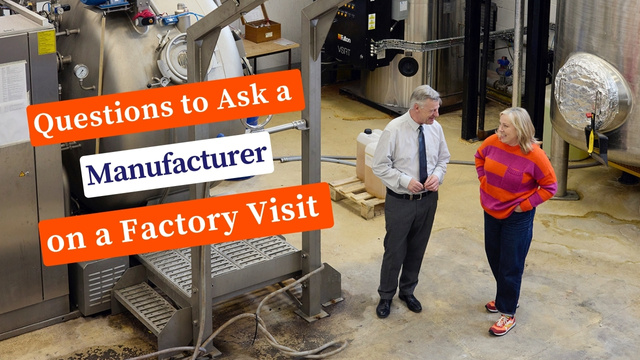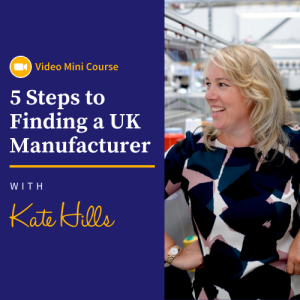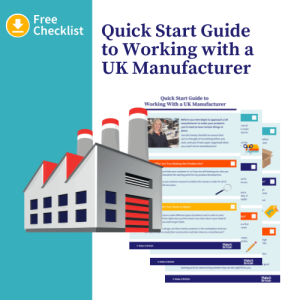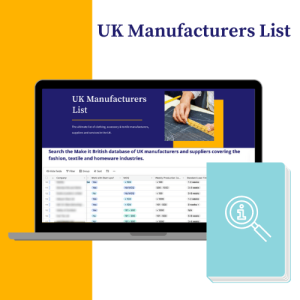Questions to Ask a Manufacturer on a Factory Visit

The right questions save you time and money
Choosing a manufacturer is one of the most critical decisions you can make in the development of your products, so it’s important to find the right one.
When you ask the right questions, you’ll avoid delays and quality issues and set your business up for a fantastic long-term partnership with your suppliers.
Below I share the questions to ask on the phone or email before you visit.
Then the questions to ask a manufacturer when you meet in person.
Questions to ask on the phone or by email before you visit
These questions help you shortlist suppliers without leaving your desk.
Use them to decide who is worth a visit.
Who else do you manufacture for?
This shows the level they operate at and the type of client they suit.
Ask who they make for now. Not who they worked with years ago.
Teams change. Ownership changes. Capability changes. So get their most up to date client list if they will share it.
What is your lead time for sampling?
Although making a sample means only making one item, it can take time and the factory will need to fit this into their production schedule.
Creating your sample may mean pattern cutting, product development work, machine set up, as well as skilled work to make the first prototype.
Allow for this in your schedule, as well as the other parts of the production process.
What is the cost for sampling?
Manufacturers in the UK will nearly always charge for samples upfront, rather than spread the cost over the production order.
Factories may charge by the hour for development or a flat fee per piece.
Expect to pay at least three times the production price, plus more for development work, so make sure you build this into your budget.
Find out how much UK garment manufacturers charge for samples here
What is your production capacity?
Make sure capacity fits your first order and your growth plan.
If you need 5000 pieces and the factory can only produce 50 a week, it is going to take a very long time to make your order.
Consider how much you can grow with a factory as your orders get bigger, or whether you might outgrow them too fast.
What are your lead times for production at the moment?
Lead time is the period from order confirmation and all materials delivered to goods ready to ship.
This can vary from product to product. Different times of the year can also affect lead-times.
A factory will plan production weeks and even months in advance in order to keep their workforce busy and not have any down-time. You need to consider this in your own critical path planning.
Allow an extra couple of weeks as a contingency and don’t just assume that they start production the minute they receive your order!
What is your minimum order quantity?
MOQs can vary depending on the product and factory. This is one of the key questions to ask a manufacturer from the start.
There is no point speaking to a supplier who will not set up for fewer than two thousand pieces when you need twenty.
Some factories will lower their usual MOQ for you, but you will pay a premium for this.
Ask about price breaks. Sometimes ordering a little more lowers your unit cost. So instead of ordering too many options, consolidate some styles and order more of the key items within your range.
What are your payment terms?
UK manufacturers need good cash flow just like any other business, so they’ll be keen for you to pay within a fixed time frame.
Most will ask for at least a 50% deposit up front, and expect to pay in full before goods leave the factory.
Go to see the final production it leaves the factory to do a quality check – it’s one of the advantages of manufacturing in the UK!
Will you sign an NDA?
Most manufacturers will sign an NDA (non-disclosure agreement) if asked.
But the bigger test is trust – if a factory shows you other brands’ designs, take that as a warning sign.
Keep detailed and dated records of when you created your designs so that you can prove they originated with you.
Questions to ask in person during your visit
So you’ve shortlisted two or three manufacturers – now’s the time to go and visit them!
You will learn more in an hour at the factory than in a week of emails.
Here’s what to ask when you get there…
Can I see the factory floor?
If they will not show you where your product is made, that is a red flag.
If they tell you that some of the production takes place in a different location ask, if you can see that too. Sometimes manufacturers subcontract part of the work when they are busy, or if they don’t have the necessary machinery.
For full transparency you want to see the whole process.
What machinery do you have?
Different equipment has different capabilities and it is worth finding out what the factory can do with the machinery it has. There may be something that they are capable of that you haven’t considered but which could drastically improve the production of your product. It may also give you ideas for future development work.
One of the great benefits of visiting a manufacturer is that you can see their range of capabilities and gain ideas for product development that might not have occurred to you before.
What quality control do you have in place?
While you go round the factory this is your chance to find out what quality controls they have in place.
At what stages of the production is the quality checked?
Do they have a gold seal sample to refer to as they go along?
Is there some sort of final inspection process that takes place before the product is shipped out?
What is the lighting like in this area? Is it well-staffed?
For products for children and babies, ask to see broken needle procedures.
A clear policy for broken needle recording and contamination checks is essential.
What audits and industry certification do you have?
Audits check management systems and workplace conditions.
A manufacturer has to pay to have an audit carried out, so some smaller manufacturers may not have them if their other customers don’t require them.
Common ones you will hear include SMETA. SEDEX. ISO 9001. ISO 14001. Fast Forward. Living Wage. GOTS.
Who will be my main point of contact?
You know the score. You go to a business and they put the best sales person in charge of the customer on-boarding.
You’re really impressed and decide to give them your order.
They then put the junior in charge of your account and everything starts to go a bit skew-whiff.
If you are impressed by the owner when they show you around then ask if you can have them as your main point of contact going forward.
When will you confirm the final cost price?
Manufacturers will usually want to make the sample to quote a final price.
It’s good to discuss what your target cost price is so that you can adjust your design if needed before they make the sample.
Give an idea of your order quantity as this will also affect the price.
Manufacturer meeting checklist
Use this during your first visit. Print it. Tick it as you go.
- Confirm who they manufacture for now and whether their capabilities match your requirements.
- Decide on an NDA and assess trust based on how they handle client work.
- Agree sampling costs and what is included up front.
- Check their MOQs and capacity align with your order size.
- Confirm current production lead-times and add your own contingency.
- Confirm payment terms and when balances fall due.
- Discuss cost prices in person.
- Review machinery and processes handled in house versus outsourced.
- Walk the full floor and any off site operation to see real working conditions.
- Review the quality control process.
- Agree your main point of contact and how you will communicate and approve
Frequently Asked Questions
Yes. Most factories charge either a flat fee per piece or an hourly development rate. Paying for samples keeps production costs clear and avoids surprises later.
That is a sign to walk away. A good manufacturing partner is transparent.
Some can. Expect a higher unit cost if you want low volumes. Ask about price breaks to see what happens if you increase the quantity slightly.
Plan ahead. Many factories plan weeks or months in advance. Build extra time into your launch schedule.
Bring a tech pack or a clear spec. Bring any patterns, as well as fabric and trim details. Have an idea of your target price and the delivery date you’re ideally looking for. The more prepared you are, the better the meeting will go!






